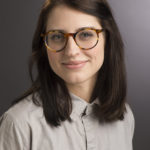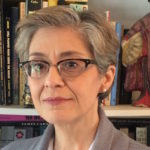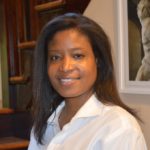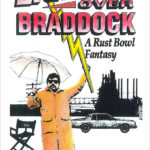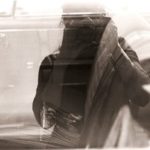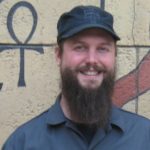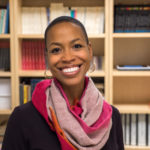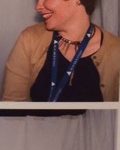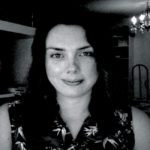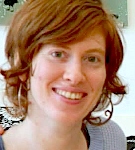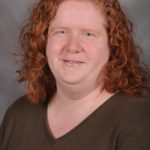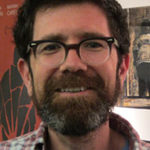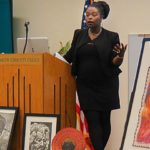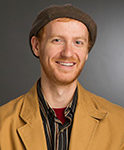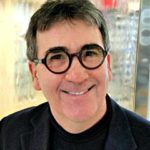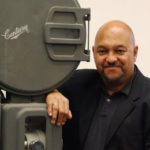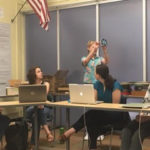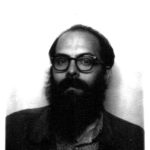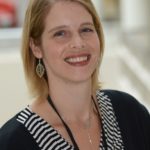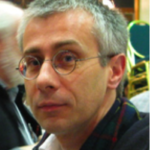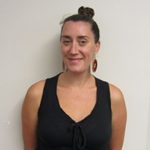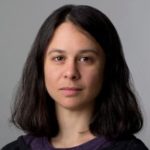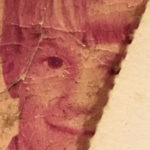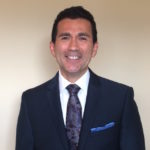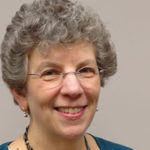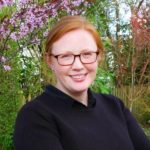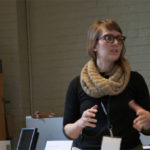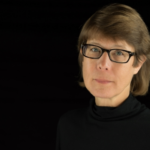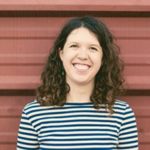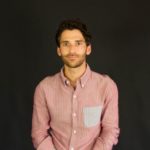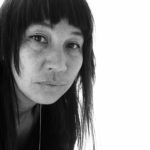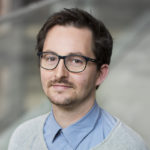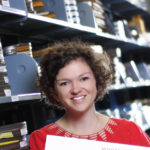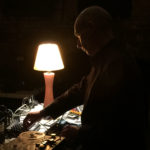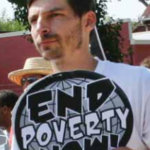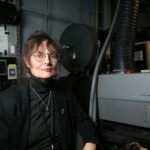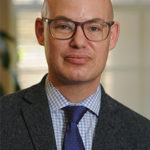2016 Speaker Information
Lauren Alberque is the Graphic Design Archive’s project archivist at the Cary Graphic Arts Collection at Rochester Institute of Technology. She is a graduate of The L. Jeffrey Selznick School of Film Preservation and holds a BA in Film & Video from Columbia College Chicago. She previously worked at RIT Libraries both in the Cary Graphic Arts Collection and the University Archives. Prior to this, she held appointments and internships at the Image Permanence Institute, George Eastman Museum, and Chicago Film Archives.
_____________________
Carla Arton is the Film Digitization Specialist at the Indiana University Libraries’ Moving Image Archive (IULMIA). In her role, Carla is defining specifications and workflow policies for the digital preservation of film held across Indiana University. She also manages the inventorying of a large backlog of educational and industrial films, home movies, and filmmaker collections held by IULMIA and other campus units. The inventory will be used to prioritize individual titles and collections for digitization as part of a larger Media Digitization and Preservation Initiative happening at Indiana University.
Before Carla joined IU, she held positions at the Library of Congress’ Motion Picture, Broadcasting, and Recorded Sound Division, the Wende Museum of the Cold War, and Chace Audio by Deluxe. She has a MA in Film Archiving from the University of East Anglia and a BA in Film Studies from Chapman University. Carla has been involved with the Association of Moving Image Archivists since 2006 when she was the recipient of the AMIA Kodak Fellowship. She was a contributing author for the 2015 publication The ARSC Guide to Audio Preservation and has co-chaired the AMIA Education Committee since 2014.
_____________________
Joanne Bernardi, a professor of Japanese Studies and Film and Media Studies at the University of Rochester, holds a doctorate in East Asian Studies from Columbia University and attended the L. Jeffrey Selznick Certificate Program in Film Preservation in 2007-2008. She has published on Japanese silent and contemporary cinema and culture, film history and historiography, material culture studies, nuclear imagery and popular culture, and digital humanities. Her ongoing and open-access digital humanities project, Re-Envisioning Japan: Japan as Destination in 20th Century Visual and Material Culture, documents changing images of Japan and its place in the world in the early to mid 20th century. Her Re-Envisioning Japan collection has been donated to the University of Rochester’s River Campus Libraries Department of Rare Books, Special Collections and Preservation, where it will be made available for research.
_____________________
Karida Brown is an Assistant Professor in the Department of Sociology at UCLA. Her research focuses on the relationship between macro structural transformations and the racial self. Her current project entitled, “Before they were Diamonds: The Intergenerational Migration of Kentucky’s Coal Camp Blacks”, reconstructs the life histories of a cohort of African-Americans who migrated throughout the Appalachian region during the African American Great Migration. In 2013, Karida founded the Eastern Kentucky African American Migration Project (EKAAMP) in partnership with the Southern Historical Collection at UNC Chapel Hill. EKAAMP is a community-driven archival and digital humanities project aimed at documenting the lives of these African American coal miners and their families in eastern Kentucky, as well as the story of the intergenerational migration of members of this community into and out of the Appalachian region during the 20th century. At the center of the Southern Historical Collection’s collecting strategy, EKAAMP presents a community-driven model for preserving raced, gendered, and classed histories that are far too underrepresented in the archive. It is a truly collaborative effort among the Southern Historical Collection, Karida Brown, and the many eastern Kentuckians who have been donating their stories and archival collections to EKAAMP and the SHC. EKAAMP is rooted in the practice of “making history” by unleashing the power of storytelling and active listening. So far, Karida has recorded over 200 oral history interviews with members of the community and the SHC has archived these recordings alongside collections of photographs, organizational records, and family papers.
_____________________
Tony Buba is the president of Braddock Films and has been producing independent documentaries since 1972 in both long and short formats, using his filmmaking as a form of community activism. In addition to producing personal work, Braddock Films has been involved in producing award winning documentaries in the Pittsburgh area. He has focused his energies on the crumbling landscape of Braddock, Pennsylvania, a once-thriving steel town, whose people and environments have been directly affected by the age of post-industrial decline.
LIGHTNING OVER BRADDOCK: A RUSTBOWL FANTASY (1988), was Tony’€™s first feature, and it established him as an innovator of the ‘€œexploded documentary.’€ LIGHTNING won numerous awards, including Best Film at the Birmingham International Film Festival in England and a nomination as best first feature film by the Independent Spirit Awards. It was shown at Sundance, Toronto, Berlin, and over a dozen other film festivals world-wide.
_____________________
Mette Charis Buchman is Deputy Head of Archive and Process at the Danish Broadcasting Corporation (DR), Denmark. Her main focus areas are within the fields of workflows, automation, optimization and training, besides transition and change management. DR is originally a traditional European public service broadcaster that today is transitioning to a public service digital media outlet. The archive is a key player in that transitioning; workflows, processes and practises need to support a digital environment internally and externally. Mrs. Buchman has been leading key projects and sat ground breaking agendas and directions for that to happen. She is fascinated by the opportunities that the information technology and the postmodern cultural characteristics provide for processing, presenting and reusing media content. Thus she also teaches Information Architecture at various Danish universities. Furthermore Mrs. Buchman is interested in the meaning and impact of moving images in the process of understanding one self and others. She is a member of the FIAT/IFTA Archive Achievement Award and an editorial board member of VIEW, Journal of European Television History and Culture. Last year she co-edited an issue called Archive Based Productions. From University of Copenhagen she holds a MA in Film and Media Studies, a MA in Cultural Studies, and a BA in Information and Library Science. From South Florida University, USA, she holds a MA in Women’s studies. Mrs. Buchman has held her position at DR for seven years. Prior to that she worked as a consultant for the BTGroup (an organisational consultant company located in the US) that specializes in workflows, business strategy, communication/branding and organisational structure in media companies.
_____________________
Natalie Cadranel is an intersectional archivist from Oakland, California working to protect and promote civil liberties and human rights. She is the Founder and Director of OpenArchive, a free, open-source mobile application that preserves and amplifies mobile media by uniting the efforts of Tor, Creative Commons, and the Internet Archive. At the nexus of privacy, provenance, and preservation, OpenArchive strives to expand the “narrative agency” of at-risk communities. She is also a founding board member of MARMIA (the Mid-Atlantic Regional Moving Image Archive) as well as part of the MediaArea team working on community outreach, documentation, and usability for MediaConch. She holds her M.S. in Information Management and Systems (MIMS) from UC Berkeley’s School of Information.
_____________________
Janet Ceja
Janet Ceja is an assistant professor, teaching and researching in the area of archival studies. Before joining the faculty at Simmons College she taught at the University of Arizona’s School of Information. Janet earned a BA in film studies from UC, Santa Barbara and an MA in film and media preservation from the University of Rochester; she is also a graduate of the L. Jeffrey Selznick School of Film Preservation at the George Eastman House in Rochester, NY. She completed her Ph.D. in library and information science at the University of Pittsburgh, where she was a memberof the American Library Association’s first cohort of Spectrum Doctoral Fellows. Before entering the doctoral program, she worked as a moving image archivist in Los Angeles, California, where she is from originally.
_____________________
Sara Chapman is executive director of the not-for-profit Media Burn Archive in Chicago, which celebrated its 10th anniversary in 2014. Media Burn Archive collects, restores and distributes documentary video created by artists, activists and community groups. Media Burn has received preservation grants from the National Historical Publications and Records Commission, the National Endowment for the Arts, as well as the federal Save America’s Treasures program of the National Endowment for the Humanities, placing its collection alongside recipients such as the original Star Spangled Banner and the iconic Rosa Parks bus. An early adopter to digital distribution, mediaburn.org launched shortly after YouTube, and now streams more than 3,000 hours of full-length archival programming. Media Burn’s videos have attracted more than 13 million worldwide views in the last ten years, a truly astonishing result for an archival collection. Ms. Chapman manages the preservation of the collection and a devoted crew of interns and volunteers, implements fundraising campaigns and grant proposals, curates and organizes public events, and works closely with the researchers, educators, students, and filmmakers who use the archive on a daily basis. Her article “Guerrilla Television in the Digital Archive” was published in the Spring/Summer 2012 issue of the Journal of Film and Video.
_____________________
Brendan Emerson Coates is a media preservation professional living in Southern California where he works as the AudioVisual Digitization Technician at the UCSB Library’s Special Research Collections. He received his MSI from the University of Michigan School of Information in 2013, having previously graduated from the U of M School of Music with a degree in Performing Arts Technology and Composition. Interests include cooking, new media art, and caring for a growing collection of fun plant life.
_____________________
Tom Colley is the Archive and Collection Manager at the Video Data Bank at the School of the Art Institute of Chicago. The VDB is a leading resource in the United States for video by and about contemporary artists. Through its distribution and preservation activities the VDB works to foster a deeper understanding of video art and artists, and to broaden access and exposure to media art histories. In addition, Tom collaborates in running the Butcher Shop, an artist run studio space. He received a Bachelor’s degree in Art and Anthropology from Oberlin College, and a Master’s degree in Library and Information Science from the University of Illinois.
_____________________
Rhea L. Combs is Curator of Film and Photography at the Smithsonian’s National Museum of African American History and Culture. She also serves as the head of the museum’s Earl W. and Amanda Stafford Center for African American Media Arts (CAAMA). Prior to joining the museum, Combs taught visual culture, film, race and gender courses at Chicago State University, Lewis & Clark College and Emory University. Additionally, Combs has independently and successfully curated film exhibitions nationally and internationally for the Schomburg Center for Research in Black Culture in New York City, the National Black Programming Consortium, and the Institute of Contemporary Arts in London, to name a few. She also worked as the assistant curator for the Spelman College Museum of Fine Art in Atlanta and as a public programs educator at the Chicago Historical Society (now Chicago Historical Museum).
Combs received her Bachelor of Arts degree from Howard University, a Master of Arts degree from Cornell University, and a Doctorate from Emory University. Her writings have been featured in anthologies, academic journals and exhibition catalogues on range of topics including African American female filmmakers, black popular culture, visual aesthetics, filmmaking and photography. Combs’ projects for the National Museum of African American History and Culture include Rising Up: Hale Woodruff’s Murals at Talladega College, Through the African American Lens: Selections from the Permanent Collection of NMAAHC, the photography books series, Double Exposure, which includes:
Through the African American Lens: A Survey of NMAAHC’s photography collection, Civil Rights and the Struggle for Equality, African American Women, and Picturing Children. Combs is also curating an inaugural photography exhibition, Everyday Beauty: Selections from the CAAMA Collection, that will open in September 2016 at the National Museum of African American History and Culture.
_____________________
Greg Cram is the Associate Director of Copyright and Information Policy at The New York Public Library. Greg endeavors to make the Library’s collections broadly available to researchers and the public. He is responsible for developing and implementing policies and practices around the use of the Library’s collections, both online and in the Library’s physical spaces. Greg has helped steer projects through a maze of complex intellectual property issues, including the release of more than 180,000 high-resolution images of public domain collection items. Greg has represented the Library in advocating for better copyright policy and has testified before Congress and the United States Copyright Office.
Greg is also an adjunct professor in the Moving Image Archiving and Preservation program at New York University and at the Palmer School of Library and Information Science.
Before joining the Library in 2011, Greg served as the copyright clearance consultant to Leadership Team Development, a business support company that organizes thousands of meetings, seminars and conferences. He also worked as a licensing associate at Sanctuary Records, a large independent record label. He is a graduate of Boston University and The Benjamin N. Cardozo School of Law. He is a licensed attorney in New York and Massachusetts.
_____________________
Carmel Curtis is currently the Digital AV Archivist for the United Nations where she works on a mass digitization project to improve preservation of and access to legacy film, video, and audio materials. Carmel is a proud member of XFR Collective (pronounced transfer collective), a volunteer run group that works to increase community access to at-risk audiovisual media by providing low-cost digitization services and fostering a community of support for archiving/access through education, research, and cultural engagement. In 2015 Carmel was a National Digital Stewardship Resident at the Brooklyn Academy of Music after graduating from NYU’s Moving Image Archiving and Preservation (MIAP) masters program. For her MIAP thesis she looked at historical and contemporary access to audiovisual materials for people who are incarcerated in the United States.
_____________________
Casey E. Davis is an audiovisual archivist and works as Project Manager for the American Archive of Public Broadcasting at WGBH Educational Foundation. Casey is founder of ProjectARCC, a task force of archivists striving to motivate the archival community to take action against climate change. She believes that archivists — those responsible for preserving history for future generations — should be as passionate and concerned about climate change and ensuring the preservation of a habitable planet for future generations. She holds an MLIS with a concentration in Archives Management from Louisiana State University and a B.A. in History from University of Southern Mississippi.
_____________________
Emily Davis
Emily Davis is an archivist with a diverse background in film and photography. Her experience with these media dates to 1998 when she became an active member of Basement Films, one of the nation’s oldest media cooperatives and micro-cinemas. Currently Emily is the senior research associate for the Carnegie Museum of Art’s Time-Based Media Project. She is responsible for preserving the museum’s time-based media artworks, and oversees access and outreach initiatives related to the collection. Previously, Emily has worked as the archivist for the Ruben/Bentson Film and Video Study Collection at the Walker Art Center, a Time-Capsule Cataloguer intern at The Andy Warhol Museum, and as an archivist at Anthology Film Archives. She holds a MLIS with an emphasis in Archives, Preservation and Records Management from the University of Pittsburgh.
_____________________
Jon Dieringer is the Technical Director of Electronic Arts Intermix (EAI), a nonprofit arts organization that fosters the creation, exhibition, distribution, and preservation of moving image art. A New York-based international resource for media art and artists, EAI holds a major collection of over 3,500 new and historical media artworks, from groundbreaking early video by pioneering figures of the 1960s to new digital projects by today’s emerging artists. Dieringer is also an independent film/video programmer, an artist, a board member of the New York Film/Video Council, and the editor and publisher of Screen Slate, a resource for listings and commentary on New York City repertory, independent, microcinema, and gallery screenings. Dieringer has also authored articles and video essays on art, film, and photography for TIME, TIME LightBox, BOMB, INCITE Journal of Experimental Media, and Canyon Cinemazine. As a programmer, he has worked most prolifically at daily Brooklyn microcinema Spectacle and additionally curated programs and series at 92Y Tribeca, Anthology Film Archives, The Film Society of Lincoln Center, and the Museum of Arts and Design. Many of these artist-focused series have focused on correspondences between archives and obsolete or overlooked media.
_____________________
Gloria Diez is a graduate from the L. Jeffrey Selznick School of Film Preservation. She has interned and worked in several institutions such as Cinemateca do Museum de Arte Moderna in Rio de Janeiro, Brazil, George Eastman Museum, Rochester, NY, and Iowa State University Park Library. She was Head of Film Preservation at GOTIKA, and is currently a Cultural Producer for the Ministry of Culture of the Buenos Aires Province in Argentina. She also serves as co-chair of the Advocacy Committee at AMIA (Association of Moving Image Archivists) and as coordinator of the Archives and Heritage Committee at ASAECA (Argentine Association of Film and Audiovisual Studies).
_____________________
Rebecca Dillmeier is the Digital Collections Manager for Film, Oral History and Recorded Sound at the United States Holocaust Memorial Museum. She came to the Museum in 2012 as an intern in the Oral History Branch after receiving an MA in Museum Studies from the University of Florida. From there, she became involved in the digitization, preservation of and access to the Museum’s oral history collection. Rebecca’s background is in oral history, Holocaust studies and digital preservation.
_____________________
Nora Dimmock
Nora Dimmock Assistant Dean for IT, Research, and Digital Scholarship at the University of Rochester’s River Campus Libraries and the founding director of the Digital Humanities Center. She holds a masters degree in Library Science from the University of Buffalo, and a doctorate in Education from the Warner School of Education at the University of Rochester. She is a collaborator on a number of projects led by University faculty members engaged in digital scholarship, including the Seward Family Papers Project, the Bragdon Train Station Project, and Re-Envisioning Japan: Japan as Destination in 20th Century Visual and Material Culture. She leads a professional staff that provides expertise in scholarly encoding schemas, digital media encoding and production, digitization, 3D modeling and printing, physical computing, and spatial and numeric analysis. Her research interests include digital humanities, academic library practice, visual and material culture, and higher education leadership.
_____________________
Jamie is lucky to have had a Mother who made sure she watched Dark Victory and Quiet Man and everything in between on the Saturday afternoon TV movies – and who made a major point of calling her in from playing outdoors for these special features. Yay Jamie’s Mom! Jamie’s first official archiving gig started in the early 90’s, working for a Commercial and Fine Art Photographer (Lou Jones) who knew his photography would hold strong archival value. He was right. In the mid-1990’s, she began to head up Research for video at Getty Images and then lead Creative efforts on building out Getty Images video portfolio for the next 10 years. Currently, Jamie has the mind-blowing good fortune of leading a team to build out the strategy to support the mass encoding and metadata initiative for Viacom’s Music and Entertainment assets.
_____________________
For over a decade prior to pursuing her Ph.D. at UNC in the American Studies, Melissa Dollman was a cataloguer, librarian, audiovisual archivist, consultant, intern, volunteer, adjunct faculty, exhibit developer, and researcher for a variety of commercial and public institutions (Pacific Film Archive, Women In Film Foundation, UCLA, Academy Film Archive, Discovery Communications, Schlesinger Library/Radcliffe Institute at Harvard University, Crawford Media Services, State Archives of North Carolina, and North Carolina State University). She has presented at numerous conferences and symposia as well as has written short pieces in the journal,The Moving Image and a chapter on privacy and home movies in the forthcoming Amateur Movie Making: Aesthetics of the Everyday in New England, 1915-1960 (Indiana University Press, 2017). Her current areas of interest include audiovisual primary documents, employing video annotation tools to document archival research labor, and a midcentury semi-fictional women’s travel director for Shell Oil. See https://melissadollman.com/ for more information. You may contact Melissa at msdollman@unc.edu.
_____________________
Ray Edmondson is a long standing AMIA member, and past chair of its International Outreach and Advocacy committees. Professionally he is the former Deputy Director and current Curator Emeritus of the National Film and Sound Archive of Australia. He has carried out missions or lectured in over 30 developed and developing countries, and his major writings have been published in 10 languages. Under the MOW banner, UNESCO recently published a new edition of Dr. Edmondson’s book Audiovisual Archiving: Philosophy and Principles.
_____________________
Susan Etheridge is a Film Technician for the Hearst Newsreel Project at the UCLA Film & Television Archive. Prior to this, Susan worked in the Restoration Department at FotoKem in Burbank, CA, and in the Archives Department at Colorlab in Rockville, MD. In addition, Susan is a researcher for the Academy of Motion Picture Arts and Sciences Visual History Project regarding motion picture film laboratories, technicians and specialists. Susan is a graduate of UCLA’s Moving Image Archive Studies Program, with film preservation and restoration as the focus of her studies.
_____________________
Dino Everett is the archivist and curator of the Hugh M. Hefner Moving Image Archive at USC. His career began in the 1970’s as a teenager running 35mm carbon arc projectors at a Florida Drive In… He has published and presented articles both on the history and technology of the moving image field and supports the safe use of original archival material and technology. He is currently working on a feature length documentary about Los Angeles punk rock in the 1970’s and has been dubbed the punk rock archivist.
_____________________
Carolyn Faber is the Media Preservation and Digitization Librarian at the School of the Art Institute of Chicago’s Flaxman Library. She has been working with audiovisual collections for over 20 years including the Chicago Film Archives, Media Burn and Kartemquin films.
_____________________
Molly Fair is the Cinematic Arts Librarian at University of Richmond. As an archivist she has worked alongside independent filmmakers and media activists to preserve their bodies of work. She is interested in understanding archives as spaces for community building, supporting social movements and preserving histories of struggle and radical transformation. She is a co-founder of Interference Archive, an alternative archive in Brooklyn, New York.
_____________________
Allyson Nadia Field is Associate Professor of Cinema and Media Studies at the University of Chicago. She is author of Uplift Cinema: The Emergence of African American Film and the Possibility of Black Modernity (Duke University Press, 2015) and co-editor with Jan-Christopher Horak and Jacqueline Najuma Stewart of L.A. Rebellion: Creating a New Black Cinema (University of California Press, 2015). Since 2009 she has served as co-curator of the L.A. Rebellion Preservation Project of the UCLA Film & Television Archive. Her essays have appeared in journals such as Cinema Journal, Framework, and The Journal of Popular Film and Television. With Marsha Gordon, she is currently co-editing a book on race and nontheatrical film in the United States.
_____________________
Amy Gallick
Amy Gallick has worked for the Library of Congress since 2002, and has been a Preservation Specialist in the Moving Image Section since 2006. She has a Bachelor’s Degree in Film Studies and English Literature from the University of Pittsburgh, including coursework at Pittsburgh Filmmakers. In 2001, she received a graduate certificate from the L. Jeffrey Selznick School of Film Preservation, and later a Master’s Degree in Library and Information Science from Catholic University. Her duties and projects at the Library are too varied and numerous to list, but range in glamour from leading preservation projects to writing government contracts. One of her most memorable task was serving as projectionist for Sandra Day O’Connor’s retirement party (they watched Red River). Amy has been devoting a portion of her time of late to preservation of the Charles and Ray Eames Collection.
_____________________
As Preservation Adjunct for NYU Libraries, Michael Grant spends his days digitally reformatting at-risk out-of-print VHS and audiocassette titles from the library’s circulating collection, and navigating the legal and technical challenges that entails. Outside of NYU, Michael does preservation and archiving work for the Educational Video Center and La MaMa E.T.C., and is a member of XFR Collective. When he’s not working, he sometimes helps out with props and graphic design for his wife, Kit’s, musicals. The balance of his time is split between washing dishes and sleeping.
_____________________
Nadia Ghasedi is Associate University Librarian for Special Collections at Washington University in St. Louis. Nadia has been with the University for nine years, working primarily with the Film & Media Archive. Nadia earned an MA in Information Science & Learning Technologies from the University of Missouri-Columbia and a Certificate in Film Preservation from the L. Jeffrey School of Film Preservation at the George Eastman Museum in Rochester, N.Y. Prior to that, she earned a BA in Communication Arts Radio-TV-Film, with an emphasis in production, and a minor in Classical Humanities from the University of Wisconsin—Madison.
_____________________
Caroline Gil is a media archivist, with experience working with artists, cultural heritage institutions, private art collectors and non-profits. Caroline has worked at the Smithsonian’s Center for Folklore and Cultural Heritage, the New Art Trust, New York Public Library, Third World Newsreel, Allied Productions, Filmoteca Cataluña and with media artists’ personal collections. Her areas of interest include Latin American video art, media collectives, experimental filmmakers and low cost solutions for digital preservation. She is a recent graduate of NYU’s Moving Image Archiving and Preservation Program, holds a Director of Cinematography Master’s from Universidad de Barcelona-ESCAC, and an Bachelor’s degree in Visual Arts.
_____________________
Dr. Marsha Gordon is Associate Professor of Film Studies at North Carolina State University. She is the author of Hollywood Ambitions: Celebrity in the Movie Age, co-editor of Learning with the Lights Off: A Reader in Educational Film, and the former co-editor of The Moving Image journal. Her book about director Sam Fuller’s war movies will be out with Oxford University Press on February 1, 2016, and she is also co-editing, with Allyson Nadia Field, a collection of essays about race and nontheatrical film for Duke University Press.
_____________________
Karen F. Gracy is Associate Professor in the School of Library and Information Science at Kent State University. She is author of Film Preservation: Competing Definitions of Value, Use, and Practice . Other recent publications include research on the evolution of moving image preservation in cultural institutions for Information & Culture: A Journal of History , and professional attitudes toward digital distribution of archival moving images for The American Archivist .
_____________________
Brian Graney is an archivist at the Black Film Center/Archive at Indiana University – Bloomington. He has specialized in moving image archives and preservation in past positions at Northeast Historic Film, UCLA Film & Television Archive, and the New Mexico State Archives. He holds an MLS from the University at Buffalo, State University of New York, and a graduate certificate from the L. Jeffrey Selznick School of Film Preservation at the George Eastman House. He is a cofounder and past director of Home Movie Day/The Center for Home Movies, and a past director of the AMIA board (2005-2010).
_____________________
Jana Grazley is a Digital Archivist at the City of Vancouver Archives, where she is responsible for managing, preserving and providing access to analogue and born-digital acquisitions. She has developed preservation and access strategies for everything from reformatted analogue video to open geospatial datasets, and is active in British Columbia’s audiovisual heritage community. Coming to the field from a background in non-profit community radio, she remains committed to exploring the application of archival theory and digital preservation principles to the management of non-textual records within the constraints of real working environments. She holds Master’s Degrees in Archival Studies and Library and Information Studies from the University of British Columbia.
_____________________
Emily Halevy is National Accounts Manager at Crawford Media Services, a creative services and media management house. In this role, she assists clients with a vast array of services including media migration, data storage, asset management, and metadata tagging. Emily has been with Crawford for over six years. Prior to joining the Crawford team, Emily was an Emmy-nominated Producer at Connect with Kids, an integrated content company, focusing on children’s healthcare, teen issues and character and drug curricula. Here she produced news packages and documentaries, often relying on the use of archival content. When Emily is not working with clients, she is busy raising her 6 and 4-year-old children.
_____________________
Dinah Handel
Dinah Handel is the Mass Digitization Coordinator for the New York Public Library, working on large-scale book and microfilm digitization initiatives. She is also a member of the xfr collective, a media preservation collective based in New York City. She holds an MLIS from Pratt Institute, and a BA from Hampshire College.
_____________________
Kelly Haydon is the Preservationist at Bay Area Video Coalition. She holds an MA from the Moving Image Archiving and Preservation Program at New York University where she focused on digital preservation strategies, community archiving, and the conservation of audiovisual material. She has implemented cataloging systems for Anthology Film Archives and for the Institute for African Studies in Accra, Ghana.
_____________________
Skyla S. Hearn is the Archivist and Special Collections Librarian at the DuSable Museum of African American History. As an activist archivist, Skyla champions for the unsung, cultural and societal contributors from African American communities and other groups not of the hegemony. She works with various community members, artists and scholars; cultural heritage, arts, education and community organizations and institutions throughout the Chicago/land area including the UIC Social Justice Initiative, the Chicago Public Library at the Harsh Research Center, Rebuild Foundation/Stony Island Arts Bank, the South Side Community Art Center and the Never-The- Same Chicago Ephemera Archive. Skyla received an MLIS with a Special Collections certificate from the University of Illinois at Urbana-Champaign and a BA in Mass Communications and Media Arts, Photography and Black American Studies from Southern Illinois University-Carbondale.
_____________________
Eric Hittinger holds a PhD in Engineering and Public Policy from Carnegie Mellon University, and a MS in Macromolecular Science and BS in Polymer Science and Engineering from Case Western Reserve University. Professor Hittinger has a background in electricity system policy, operation, and economics, with a focus on understanding the benefits and limitations of energy storage and renewable electricity sources. His research often uses techno-economic modeling of electricity systems to understand the effects of system policies and interactions.
_____________________
Jim Hone, Digital Archivist, has over 30 years of experience in media production, digitization, and preservation including 11 years at CBS-TV in New York. His past projects include the video preservation and digitization of former Congressman Richard A. Gephardt’s media materials for the Missouri History Museum. Jim holds a BA in Government from Manhattan College and a M.Div. from Weston Jesuit School of Theology. His responsibilities in Special Collections include digitizing time-based media holdings for access as well as the development of long-term digital preservation strategies.
_____________________
Chris Ivey is an award-winning filmmaker including Addy Awards for his commercial campaigns. After years of race discrimination in the advertising industry, he ventured into documentary to address his frustrations with racism and public policy in Pittsburgh and act as a conduit for its underserved Black community.
His internationally acclaimed documentary series East of Liberty focuses on race, class and gentrification fears. The long-term goal is to make it available in schools, libraries and archives, educating future generations on urban renewal and gentrification. He views media as indispensable in offering Black youth alternative visions of success.
Chris was featured on NPR’s All Things Considered: Going There in Pittsburgh segment on unaddressed impacts of gentrification on Black communities. He is completing East of Liberty: Youth Rising, which interweaves the experiences of youth in Pittsburgh, Baltimore and Philadelphia. Students speak first-hand about their experiences with teen pregnancy, gangs, and envision their futures.
_____________________
Carleton Jackson is the Head of Library Media Services, University of Maryland Libraries. He manages a library and staff specializing in physical and digital media collections, providing services to access collections directly and electronically. These services also now include media collection conservation and technology assistance, curricular planning, media integration and video production. The facilities are available to students, faculty and staff for the use of visual media as an integral part of coursework, research and publishing. And in an innovative community engagement program, many of these services are also available to affiliate community film and arts creatives working in collaboration with the Libraries and campus.
_____________________
Jennifer Jenkins teaches film history and theory, literature, and archival practice at the University of Arizona. She is the founder of Home Movie Day Tucson, regularly projects 16mm in the classroom, and lays student hands on film of many gauges. She identified, preserved, and published the first scholarly work on the Tucson-based Western Ways Film Collection of over 100 midcentury nitrate films. The resulting single-authored book, Celluloid Pueblo: Western Ways Films and the Invention of the Postwar Southwest, will be published by UA Press in 2016. Since 2011, she has been Curator of the American Indian Film Gallery, a digital humanities project that seeks inclusive repurposing of mid-century films about Native peoples. In a process, termed “tribesourcing,” Native community members are invited to re-narrate the films in indigenous or/and European languages. These new audio files will provide culturally-competent counter-narratives to the films, thereby expanding access and enriching the collection’s information base. In 2017, these remastered, decolonized films will migrate to a Mukurtu-based content management site which ensures culturally-sensitive archiving.
_____________________
Charlotte Johnson
Charlotte Johnson has been at Paramount for over a decade, and was a key player in ushering the studio into the digital age. She has overseen the implementation of Paramount’s first DAM system and was highly involved with the expansion of the digital archive to handle Preservation level assets. In her spare time she enjoys playing Mandolin and Banjo, concert photography and is an unabashed Star Trek nerd.
_____________________
Julieta Keldjian
Julieta is an assistant professor at the Department of Communication of Universidad Católica del Uruguay and head of the Audiovisual Archive “Prof. Dina Pintos”. She specialized in audiovisual preservation at Filmoteca Española (Spain) and Laboratorio la Camera Ottica, Università degli Studi di Udine (Italy). Her research interests cover home movies and small gauge film. She has provided consultancy in film heritage to the Uruguayan Film Institute and has coordinated heritage digitization projects. She is member of the research group GESTA (Grupo de Estudios Audiovisuales) in Uruguay.
_____________________
John Klacsmann is Archivist at Anthology Film Archives in New York City where he preserves artist cinema. Klacsmann holds a Bachelors of Science in Computer Science from Washington University in St. Louis and is a graduate of the George Eastman Museum’s L. Jeffrey Selznick
School of Film Preservation. Before joining Anthology, he worked as a preservation specialist and optical printing technician at Colorlab, a film laboratory in Maryland. He is a contributing editor to INCITE: Journal of Experimental Media and a co-editor of the recently published volumes of The Collections of Harry Smith Catalogue Raisonné (J&L Books, 2015).
_____________________
Criss Kovac is the supervisor of the Motion Picture Preservation Lab at the National Archives and Records Administration. Over the course of the last decade she has overseen preservation projects including Nine From Little Rock, A Year Toward Tomorrow, With the Marines at Tarawa, The Negro Soldier, Let There Be Light, and The March. She is an active participant within The Federal Agencies Digitization Guidelines Initiative and is a member of the International Federation of Film Archives Technical Committee. She holds degrees from Oberlin College in History, from The Nottingham Trent University in Cinema Studies, and received certification from The L. Jeffrey Selznick School of Film Preservation in 2002.
_____________________
Reto Kromer holds degrees in both mathematics and computer science. He became involved in audio-visual conservation and restoration over thirty years ago, and from 1998 to 2003 he was head of preservation at the Swiss National Film Archive. Since 2004 he has been running his own preservation companies, providing comprehensive services that encompass the whole range of moving image preservation. He has lectured at the University of Lausanne, the Academy of Fine Arts Vienna, and currently lectures at the Bern University of Applied Sciences. His courses cover the conservation and restoration not only of audio-visual content but also audio-visual carriers, usually with a focus on technical issues and movie picture film. His current research includes color spaces, CLUT and codec programming and emulation. He is serving as a board member of the Albanian Cinema Project (ACP).
_____________________
Anthony L’Abbate
Anthony L’Abbate is a 1999 graduate of The L. Jeffrey Selznick School of Film Preservation. After graduating from The Selznick School he worked for two years at the Cinema Arts laboratory in Pennsylvania as a technician. Anthony returned to Rochester, New York in the fall of 2001 as the stills archivist in the Motion Picture Department at George Eastman House a title he held until 2007 when he became preservation officer.
_____________________
Zun Lee is an award-winning Canadian photographer, physician and educator. He was born and raised in Germany and has also lived in Atlanta, Philadelphia and Chicago. He currently resides in Toronto. He was awarded a Magnum Foundation Fellowship in 2015. Lee has been globally recognized as one of the top emerging visual storytellers to watch. His focus on the importance of quotidian Black life has led to publications in the New York Times, Slate, Wall Street Journal, TIME, The New Yorker, Huffington Post, MSNBC, Washington Post, Forbes, and Hyperallergic. For his project Father Figure, Lee places the topic of black father absence stereotypes into a broader context of pathologized black masculinity. The resulting monograph, produced by acclaimed publisher Ceiba Foto, has won several major international awards. Lee also worked on repeated assignments in Ferguson, Missouri in the fall of 2014, where he engaged the local community to produce a more nuanced narrative of protest and resistance.
His latest project Fade Resistance interrogates a gap in the recent history of black visual representation through a digitized archive of over 3,500 found Polaroids of African American families. Produced from the 1970s to the early 2000s, these photographs were made without the intention of being seen, or judged, by those outside of an intimate circle. By showing how black families documented themselves throughout recent decades, this project seeks to illuminate how black communities codified their own lives to generate meaning and belonging. The fact that the original families no longer own these Polaroids also brings into focus a sociopolitical dynamic of black dispossession and dislocation that looms over the archive as a whole. This inevitably brings up issues of agency and empowerment pertaining to the contemporary production and dissemination of visuals of the black body.
_____________________
James Lewis attended Armstrong State University in Savannah, GA, earning a BA in English and Film Studies. He did the same at North Carolina State University in Raleigh, NC, earning a Masters Degree for his thesis “Those Weren’t the Days: Nostalgia for the 1950s in Steven Spielberg’s E.T.: The Extra-Terrestrial, Tobe Hooper’s Poltergeist, and John Carpenter’s The Thing“. He currently lives in Pittsburgh, PA, and works at The MediaPreserve in Cranberry Township, PA.
_____________________
Jeremy Linden, Senior Preservation Environment Specialist, joined IPI in January 2010. He is primarily involved in the environmental management activities of IPI and works closely with colleagues in libraries, archives and museums on issues of material preservation, mechanical system performance, energy-saving and sustainability. Jeremy earned an MLS in Information Studies and an MA in History from the University of Maryland, and a BA in History from Vassar College. A certified archivist, Jeremy has over 10 years’ experience working in archives, museums and historical societies. His interests include birding, hiking, hunting, and gardening – if it gets him outside, he’s happy.
_____________________
Kristin Lipska is a Project Assistant at the California Audiovisual Preservation Project (CAVPP) where her responsibilities include maintaining the digitization workflow, communicating with vendors and partner institutions, processing original recordings, and checking the quality and integrity of audio and video files. Kristin earned a B.A. in Film and Digital Media from the University of California, Santa Cruz, and a Masters of Library and Information Science from San Jose State University. She has worked on projects to digitize home movies for the Prelinger Archive, and the Center for Asian American Media, and she gained experience in video QC as an intern in the preservation department of the Bay Area Video Coalition. A California native, Kristin has been working to preserve California’s audiovisual heritage at CAVPP since 2013.
_____________________
Megan MacDonald is a project archivist at the Black Film Center/Archive, Indiana University – Bloomington, where she oversees the reprocessing and digitization of the Richard E. Norman collection. She previously served as archivist for Indiana University’s Liberian Collections. She received her Masters in Library Science with a specialization in archives and records management at Indiana University in 2007.
_____________________
Robin Margolis is a current MLIS student specializing in Media Archival Studies at the UCLA Department of Information Studies. He completed his B.A. in Media Studies at Pomona College. He approaches archives from a foundation as a teaching artist, community organizer, and filmmaker, aiming to serve social movements both emergent and ongoing. His research interests involve community-based archiving, oral history in the digital age, personal digital archiving, archiving performance, archives as a site for transmission of culture and political memory, and continuum informatics He has worked in the film industry and as a union researcher. He currently contracts with Oral History Projects at the Academy Foundation and serves as a Reference Desk Assistant at the UCLA Music Library.
_____________________
Nicole Martin is the Senior Manager of Multimedia Archives and Digital Systems at Human Rights Watch. She teaches Digital Preservation as an adjunct professor at New York University’s Moving Image Archiving and Preservation program. Before working at Human Rights Watch, Nicole was the archivist at the daily live television and radio news program, Democracy Now! She received an undergraduate degree in Film and Digital Media from the University of California, Santa Cruz, where she also studied electronic music, CD-ROM production, and early live-stream video broadcasting.
_____________________
Rachel Mattson works at the intersections where archival practice meets queer political & aesthetic desire. She currently works as the Manager of Special Projects in the Archives of La MaMa Experimental Theatre Club, and is a core member of both the XFR Collective and Librarians and Archivists with Palestine. She holds a PhD in U.S. History from NYU (2004) and an MLIS from the University of Illinois, Urbana-Champaign (2014). Her writing has appeared in the Radical History Review, the Scholar and the Feminist, Movement Research Performance Journal, and in books published by Routledge, Washington Square, and Thread Makes Blanket Press, among other publications.
_____________________
Taylor McBride is an audiovisual archivist working with collections across the Smithsonian on the Institution’s Digital Asset Management System. She is a Co-Chair of the Association of Moving Image Archivists’ Small Gauge and Amateur Film Committee and a founding board member of the Mid-Atlantic Regional Moving Image Archive (MarMIA). Taylor is a 2012 graduate of NYU’s MIAP program and previously worked as an archivist at the Smithsonian’s Anacostia Community Museum Archives and Ralph Rinzler Folklife Archives and Collections.
_____________________
Nancy McDonald is currently the Production Manager at Kartemquin Films, a collaborative center for documentary media makers who seek to foster a more engaged and empowered society. In 2016 Kartemquin is celebrating 50 years of sparking democracy through documentary.
Nancy first joined the Kartemquin family as an intern of Xan Aranda and assisted on her film Andrew Bird: Fever Year. She then worked for several years as a Production Coordinator on an educational children’s television show, Green Screen Adventures. Her roles there included costume design/styling for which she was nominated for a National Daytime Emmy.
For the past few years she’s worked as a staff member for Kartemquin Films in a variety of roles, from event planning to assistant editing to keeping the archive project in motion. She is extremely passionate about Kartemquin’s archive and struggles with the daily challenge of working to maintain and grow it while juggling a variety of other priorities.
_____________________
Miriam Meislik currently serves as Media Curator for the Archives Service Center at the University of Pittsburgh and as an Adjunct Lecturer in the School of Information Science. She holds memberships in the Association of Moving Image Archivists (AMIA) and the Society of American Archivists where she is most active. In the Society of American Archivists, Miriam has served as chair, Visual Materials Section; chair, Visual Materials Cataloging and Access Roundtable; photograph editor for the Archival Fundamentals Series II; and is a past member (2012-2016) of the SAA Foundation National Disaster Fund for Archives Grant Review Committee, and the Archival Educators Roundtable Steering Committee (August 2016- present). Outside of SAA, Miriam has served as an article reviewer for Western Pennsylvania History Magazine; has been a book review contributor for the Indiana Journal of History; and authored, Historic Photographs of Pittsburgh which was published by Turner Publishing in 2008. She has presented on a wide range of topics including disaster recovery, the preservation and organization of photographic collections, and working with researchers in media collections. She is active in the Alliance for Response, Pittsburgh chapter serving as chair, (2014-2015; 2011-2012) and vice-chair (2013). Research interests include, analog and digital preservation of photographic and moving image archives; researcher use of media collections including issues surrounding copyright; disaster recovery and response. Miriam is a graduate of Edinboro University of Pennsylvania and the University of Pittsburgh.
_____________________
Isabel Meyer is the Information Technology Branch Manager responsible for the Smithsonian Institution’s Enterprise Digital Asset Management System (DAMS). The Smithsonian is the world’s largest museum complex with 19 museums, 9 research centers, and the National Zoo, holding 138 million objects and specimens. Isabel provides expertise and direction across all the diverse Smithsonian units on the preservation, management, security, and storage of digital assets (text, images, video, and audio). Under her leadership since 2008 the DAMS has expanded from a pilot system with 24,000 image assets to a mission critical enterprise system currently serving more than 800 users across 40 units, managing close to 8 million digital assets. Prior to joining Smithsonian’s Office of the Chief Information Officer in 2003 she worked in all facets of systems and digital media technologies in public and private sectors, Fortune 500 corporations, and start-up companies in the U.S. and internationally.
_____________________
Candace Ming is the Program Manager/Archivist of the South Side Home Movie Project. The South Side Home Movie Project is an archival and research initiative to collect, preserve and exhibit amateur films from Chicago’s South Side neighborhood. This project grew from the notable absence home movies (especially from minorities) in the canon of film scholarship, which is only now beginning to change. The project also seeks to provide context and history for this historic neighborhood. Supported by the University of Chicago’s Center for the Study of Race, Politics, & Culture and the Film Studies Center, the South Side Home Movie Project is both a film preservation project and a visual history of Chicago’s South Side neighborhoods.
Candace is a graduate of the Moving Image Archiving and Preservation program at New York University. Before joining the South Side Home Movie Project she worked as a Public Records Officer for the New York Police Department designing the infrastructure they would need to archive and store their vast collection of training films. She also worked at the Museum of Modern Art where she worked with Curator Ron Magliozzi and Conservateur Peter Williamson on the newly discovered outtakes of an unreleased Biograph Bert Williams film. Ming researched the lead actress in the film, identified as Odessa Warren Grey.
_____________________
Morgan Oscar Morel received a MSI from the University of Michigan’s School of Information after receiving his Bachelor’s degree in Media Arts Technology from the U of M’s School of Music. Since leaving the wonderful hand-shaped state, Morgan has been working at George Blood Audio/Video/Film in Philadelphia. While working as the IT Sys Admin, Morgan has developed various digitization workflows, incorporating standards and best practices wherever possible. During this time, Morgan has also served on the AMIA PBCore Sub-Committee in order to further the breadth, reach, and utility of the PBCore Metadata Standard. Current obsessions include video synthesizers, new age cassettes, and american cosmic music.
_____________________
Hanni Nabahe
Hanni Nabaheis a recent graduate from the University of Arizona’s School of Information where she earned an MLIS with Digital Information Management concentration and a graduate certificate in Archive Studies. A Knowledge River alumna and former Association of Research Libraries Fellow, Hanni has worked for Pima County (AZ) Public Library for the past 8 years, first as library instructor and now as substitute librarian. She currently attends the Eller School of Business at Arizona and is pursuing an Master in Business Administration with a focus on Management of Information Systems.
_____________________
Raymond G. Najjar, Jr. is a Professor of Oceanography in the Department of Meteorology and Atmospheric Science at The Pennsylvania State University, where he has been on the faculty since 1993. He earned his Ph.D. in Atmospheric and Oceanic Sciences at Princeton University in 1990 and was then a post-doctoral fellow at the National Center for Atmospheric Research until 1993. At Penn State, he teaches numerous courses in oceanography and atmospheric science. Dr. Najjar conducts research on a variety of topics in hydrology, oceanography, and climate science. He has co-authored more than 60 peer-reviewed studies with funding from the Environmental Protection Agency, the National Science Foundation, the National Oceanographic and Atmospheric Administration, the National Aeronautics and Space Administration, the Pennsylvania Department of Environmental Protection, and Pennsylvania Sea Grant.
_____________________
Mick Newnham is currently the Manager of Conservation & Research, at the National Film and Sound Archive of Australia (NFSA) based in Canberra, Australia. For the past 20 years Mick has been providing consultancies and training in audiovisual collection management and preservation on behalf of the NFSA and organizations such as UNESCO, SEAPAVAA, ASEAN and ICCROM for collections across the world. Mick is a lecturer in audio visual preservation with the Charles Sturt University and a Visiting Fellow at the University of Melbourne, Grimwade Centre for Cultural Materials Conservation.
_____________________
Yvonne Ng is the Senior Archivist at WITNESS, where she manages a collection of human rights video and develops training materials on video archiving aimed at activists. She is also a member of XFR Collective, a non-profit that provides low-cost preservation services for artists and small organizations. Since 2010, she has co-organized the annual Community Archiving Workshop at the AMIA conference. In Summer 2016, she co-taught a new Personal Digital Archiving course at New York University. She holds an M.A in Moving Image Archiving and Preservation from NYU.
_____________________
Devin Orgeron is the author of Road Movies: From Muybridge and Melies to Lynch and Kiarostami (Palgrave, 2008). His articles have appeared in Cinema Journal, The Velvet Light Trap, The Moving Image, The Journal of Film and Video, CineAction, College Literature, Post Script, and Film Quarterly. He is the co-editor of Learning With the Lights Off: Educational Film in the United States, (Oxford University Press, 2012). Dr. Orgeron is the former editor of The Moving Image (University of Minnesota Press), and he is currently working on two book projects: one focused on the nontheatrical media of David Fincher, and the other and exploration of contemporary American directors working in advertising.
_____________________
Jeffrey Osmer
Jeffrey Osmer began his film career in the late 80’s as a production assistant on CBS’s “The Equalizer”, and later found his niche working in numerous cutting rooms for TV MOW’s and Feature Films. His freelance time in the picture and sound editing realm lead to a full time work in the film archives, first at 20th Century Fox and most recently at Paramount Pictures. His time spent in and around the cutting room proven its value when “digging” for hidden gems among an older film’s editorial trims.
_____________________
San Francisco archivist, curator and imagemaker, Stephen Parr, founder of Oddball Films has a long history in presenting and archiving the unusual. In the seventies, he produced and videotaped live performances of The Ramones and John Cage. In the eighties, he screened his signature pop culture montages in venues across the U. S. and Europe; from the Danceteria in New York to the Moscow Cinematheque.
Later, he began building an archive and licensing stock footage. He continued producing his montage-based works while licensing his offbeat archive to feature film, documentary and music video producers. Oddball Films has since provided footage for clients as diverse as Ridley Scott and Spike Lee and for films such as Milk and Black Panthers: Vanguard of the Revolution.
Parr began his cinematic and videotape experiments at the Center for Media Study at SUNY Buffalo where he studied with Paul Sharits, The Vasulkas and Nam June Paik. His programs have explored the erotic underbelly of sex-in-cinema (“The Subject is Sex”), the offbeat and bizarre (“Oddities Beyond Belief”), the pervasive effects of propaganda (Historical Hysterical!) and altered states of pop/spiritual culture (“Euphoria!”).
His films have screened at the World Music Festival, The Belfast Film Festival, Experimenta India, The Leeds International Film Festival, The Pacific Film Archive, The Anthology Film Archives, and other venues worldwide. He is also director of the San Francisco Media Archive, non-profit dedicated to the preservation of culturally significant film and related media and serves on the board of the Albanian Cinema Project.
_____________________
David Pierce
David Pierce is an independent film historian and archivist. His report on the survival of American silent feature films was published by the Library of Congress in 2013. He co-wrote The Dawn of Technicolor (2015) and King of Jazz: Paul Whiteman’s Technicolor Revue (2016) with James Layton. Mr. Pierce founded the Media History Digital Library, providing free online access to millions of pages of motion picture magazines and books.
_____________________
1965: Born. 1983: First movie camera (super-8). 1985: Moved to Pittsburgh. 1993: Started The Orgone Cinema and Archive with Jeff Armstrong & Michael Johnsen; Married Alisa Dix. 1997: Merce Anna Pierce born. 2000: Orla Kren Pierce born. 2001: First vasectomy. 2006: First scuba dive. 2008: First mid-life crisis. 2013: Merce Lemon born.
Presently: Coach – Pittsburgh Dynamo U12 girls travel team; stunted guitarist, The Working Poor; Custodian – The Orgone Archive; Associate Curator of Film and Video – The Andy Warhol Museum
The Orgone Archive is a motion picture archive and screening outfit based in Pittsburgh, Pennsylvania specializing in inscrutable epiphanies, toilet trims, unknown what-have-yous, perfect industrial rolls, home movie printing tests, corporate comedies, Warholian strikebreaking screeds, the all-around beautiful and everything else. Originally founded in 1993 as Orgone Cinema by Jeff Armstrong, Michael Johnsen and Greg Pierce as a break-even motion picture exhibition group dedicated to a sincere film culture in Pittsburgh, it presented unique monthly shows of home movies, industrial, educational, experimental, and documentary films, light and sound performances, and visiting film and videomakers at the Silver Eye Center for Photography on the city’s South Side. Orgone is also (and was) a travelling cinema band that screens and performs films at home and nationally. Greg Pierce is the current custodian of this proudly fringe collection.
_____________________
Kate Pourshariati is a film archivist at the Penn Museum where she works with a range of culturally and historically significant motion picture films, dating from 1913 to the 1990s. Kate has been involved with restoration of (possibly) the first documentary sound film, Matto Grosso, the Great Brazilian Wilderness (1931), the seminal series Navajo Film Themselves (1966) and Native Life in the Philippines (1913). In addition to the cataloging, restoration and digitization of films, she has been working with source communities to share back the Museum’s historic film materials for re-interpretation and revision. Since 2011, she has been curating cultural documentary screenings at the Museum, including a more recent occasional series called Live from the Archives! which consists of films made using Museum archival footage. Kate studied visual anthropology with several principal filmmakers of the field; Jean Rouch, Tim Asch, and cinema-verite founder Richard Leacock at Harvard. Among other works, she has written on the films and photographs of the anthropologist Frank Speck, for an upcoming festschrift. In 2014 she cataloged, processed films and created a finding aid for the Margaret Mead and Gregory Bateson film collections of Bali and Papua New Guinea for the Library of Congress.
_____________________
Mark A. Puente is the director of diversity and leadership programs for the Association of Research Libraries (ARL) in Washington, DC. He has served in this role since March of 2009. Puente manages all aspects of ARL’s diversity and inclusion programs as well as several leadership development offerings. He is the ARL staff liaison to the Committee on Diversity and Inclusion, leads assessment efforts across his portfolio, and designs and directs the annual ARL Leadership Symposium. A frequent speaker, clinician, and facilitator, Puente also contributed to the planning of the National Diversity in Libraries Conference (NDCL ’16) held in August. He is the principal investigator of the ARL/Society of American Archivists’ (SAA) Mosaic Program, an initiative that seeks to recruit individuals from historically underrepresented groups into the archival profession. Puente is a graduate of the Knowledge River Program at the iSchool at the University of Arizona, and was a 2003 American Library Association Spectrum Scholar. Prior to working for ARL, Puente worked in a variety of music library settings including at the University of Illinois at Urbana-Champaign, the University of Tennessee, Knoxville, and the University of North Texas. He is a native of San Antonio, Texas.
_____________________
Eva Radding joined Facing History and Ourselves in 2007 as a librarian, cataloging (among other things) in-house video for the library catalog. In leading Facing History’s DAMS project from its inception in 2013, she oversaw digitization of video materials, created a specialized taxonomy, configured workflows in collaboration with colleagues throughout the organization, and even organized a contest that led to naming the archive. Now, as Digital Archive and Library Systems Manager, Eva is responsible for all aspects of the DAMS’ operation. She coordinates tagging, develops policies, trains staff, creates documentation, and troubleshoots technical issues.
Eva holds an MSLIS from Simmons College, a Public and Nonprofit MBA from Boston University, and a BA from Yale University.
_____________________
Sarah Romkey is the Program Manager for the Archivematica project, managed by Artefactual Systems. Sarah is a graduate of the Dual MAS/MLIS program at the University of British Columbia’s School of Library, Archival and Information Studies (2008), and previously worked as an archivist for the Rare Books and Special Collections branch of the UBC Library. While there she used both ICA-AtoM and Archivematica, starting when they were still in beta development. Her Master’s Degree work included internships at the City of Vancouver Archives and UBC Library, and she also worked as a research assistant on the InterPARES 3 project.
Sarah has served on the Board of the Archives Association of B.C. and has presented at Association of Canadian Archivists conferences and the UNESCO Memory of the World in the Digital Age conference in Vancouver (2012) on matters of digital preservation and access.
_____________________
Josh Romphf, Digital Humanities Programmer for the University of Rochester’s River Campus Libraries Digital Humanities Center, is a graduate of the L. Jeffrey Selznick School of Film Preservation M.A. program. He specializes in software development, video encoding, and fabrication, and is a key collaborator on all faculty projects developed by the DH Center. He has taught workshops for the Selznick School, the Digital Humanities Summer Institute, the University of Buffalo, and the University of Ottawa, and has written for the Code4Lib Journal and the Cinema Journal Teaching Dossier. His interests include computer vision and its use in digital restoration, digital fabrication / physical computing, and the development of open source hardware and software to help facilitate digital preservation.
_____________________
Annie Schweikert is a project media archivist at the Human Studies Film Archives, Smithsonian Institution, where she processes film collections and oversees magnetic media digitization. She received her BA in Film and Media Studies from Yale in 2015, and was introduced to the field of moving image archiving through her student job at the Yale Film Study Center.
_____________________
Amy Sloper is the Head Film Archivist at the Wisconsin Center for Film and Theater Research in Madison, Wisconsin and a lecturer and advisor in the UW-Madison’s iSchool. Before returning to her home state of Wisconsin, she held positions at the Harvard Film Archive, the Getty Research Institute, and the Director’s Guild of America. She serves on the Board of Directors at the Center for Home Movies and has been organizing Home Movie Day and community archiving events since 2007 in storefronts, cinemas, community centers, classrooms, libraries, and public access television stations from Boston, MA to Bayfield, WI.
_____________________
James Snyder is an Emmy award winning digital media engineering, data & media archiving, preservation, production and project management specialist. His 36 years’ experience includes television, film, radio, internet & data technologies from traditional analog to cutting edge digital audio, video and data technologies. His career includes the commercial, non-commercial and government sectors. He was awarded a 2007 Technology Emmy for his work on the ATSC digital television standard.
Mr. Snyder serves as the Senior Systems Administrator for the Library of Congress’ National Audio-Visual Conservation Center (NAVCC) on the Packard Campus for Audio Visual Conservation in Culpeper, Virginia (http://www.loc.gov/avconservation/packard/). His responsibilities include all audio, video and film preservation and digitization technologies, including long-term planning & implementation, long-term data preservation planning & implementation, technology services to the United States Congress and organizations on Capitol Hill, as well as standards participation and technology liaison with media content producers worldwide. He has worked for many organizations in media, entertainment, engineering & communications including MCI, Verizon, Intelsat, PBS, the ABC Radio & Television networks, Harris Corporation, the Advanced Television Test Center, Fox News, Communications Engineering Inc, Reuters and Discovery Communications. He has consulted on many types of projects for organizations including Sarnoff Corporation, Turner Engineering, CBS, NBC, ABC, Fox, the News Corporation, FedNet and multiple agencies of the U.S. Federal government. He has worked on key projects in the creation and standardization of the ATSC digital television standard, the HD Radio digital radio standard, the AXF Archive eXchange Format (SMPTE 2034) standard, as well as the first consumer commercial HDTV satellite service Unity Motion.
Mr. Snyder is a member of the Audio Engineering Society (AES), the Institute of Electrical and Electronic Engineers (IEEE), the Association of Motion Imaging Archivists (AMIA) and the National Academy of Television Arts & Sciences (NATAS). He is a member and serves as an officer & on standards committees of the Society of Motion Picture & Television Engineers (SMPTE). He serves on technical committees of the AMWA (Advanced Media Workflow Association) and the Academy of Motion Picture Arts & Sciences. He lives and works in central Virginia near Washington, DC.
_____________________
Lauren Sorensen is a consulting archivist & media conservator interested in digital preservation, community initiatives, independent media and open access. An incoming PhD student at UCLA’s Information Studies program, she has held positions at the Library of Congress, Bay Area Video Coalition (BAVC), and independent film distributor Canyon Cinema, among others. She received her Masters in Moving Image Archiving & Preservation from New York University in 2007. She was recently elected as Secretary and Director of the Board of Association of Moving Image Archivists’ (AMIA) and is program chair for the Electronic Media Group of the American Institute for Conservation of Historic & Artistic Works (AIC).
_____________________
Molly Rose Steed is Assistant Head, Moving Image and Sound Archivist at the University of Utah’s J. Willard Marriott Library. She oversees the Audio-Visual Archive within the Library’s Special Collections Division, which specializes in materials representing the history and culture of Utah and the American Intermountain West. While pursuing a master’s degree in Film Studies with concentration in Film Archiving at the University of East Anglia and volunteering at both the Yorkshire Film Archive and the East Anglian Film Archive, Molly developed a love of regional film. When she completed her degree she returned home to Salt Lake City where she has been an archivist at the University of Utah since 2008.
_____________________
Linda Tadic is Founder and CEO of Digital Bedrock. She has over 25 years’ experience in leading preservation, metadata, and digital production operations at organizations such as ARTstor, HBO, and the Media Archives and Peabody Awards Collection at the University of Georgia. Currently an adjunct professor in UCLA’s Moving Image Archive Studies program teaching Digital Asset Management, she was previously an adjunct professor in NYU’s Moving Image Archiving and Preservation program (courses in collection management and cataloging and metadata). She consults and lectures on digital asset management, audiovisual and digital preservation, copyright, and metadata with clients as diverse as WNET/Thirteen, the Academy of Motion Picture Arts and Sciences, SBS (Australia), Dunhuang Academy (China), ESPN, and the Missouri History Museum. She is co-author of the book Descriptive Metadata for Television: an End-to-End Introduction (Focal Press, 2006), and is a founding member and former President of the Association of Moving Image Archivists (AMIA).
_____________________
Eira Tansey is the Digital Archivist/Records Manager for the University of Cincinnati. Tansey is responsible for the university’s records management program, and for the planning and development of workflows related to born-digital archives and digital preservation of electronic records. She received her BA in Geography from the University of Cincinnati and her MLIS from San Jose State University. She has previously worked at the Louisiana Research Collection at Tulane University. Tansey is active in several archivist organizations, and her research area concerns the intersection of archives and the environment. She recently published “Archival adaptation to climate change” in the journal Sustainability: Science, Practice, & Policy (2015).
_____________________
Kimberly Tarr is the Head of the Media Preservation Unit in the Barbara Goldsmith Preservation & Conservation Department at New York University Libraries. In this role, she oversees preservation activities for all film, video, and audio collections. Tarr received her B.A. in American Studies from the University of California, Berkeley and her M.A. from New York University’s Moving Image Archiving and Preservation (MIAP), a graduate program in which she currently serves as an adjunct instructor. In 2014, she served as the film archivist on the restoration of The Grim Game (1919), the first feature film to star Harry Houdini which was long thought to be a lost silent film.
_____________________
Irene E. Taylor
Irene E. Taylor is employed as the Cataloging and Preservation Archivist in Special Collections at Washington University in St. Louis since 2010. She received a master’s degree in Moving Image Archiving and Preservation from New York University, as well as a master’s degree in Film Studies from Emory University, and an undergraduate degree in Interdisciplinary Studies: Communications, History and English from Boise State University.
_____________________
Paolo Tosini
Paolo was born in Rome where he studied film restoration at the University of Udine in Italy and at the Bundesarchive in Berlin. Paolo worked for more than 12 years at Le Giornate del Cinema Muto in Pordenone, Italy. He is a consultant at the Dominican Republic Archivo General de la Nación and other institutions in Latin America. He was Coordinator of the Digital Restoration Lab at the Cineteca Nacional México and speaks regularly at international film events, most recently at Festival Internacional De Las Luces México.
_____________________
Ben Turkus oversees all of BAVC’s preservation and digitization activities, developing workflow, documentation, and technical practices. He has a BA from the University of Pennsylvania, an MA in Film Studies from Columbia University, and is currently pursuing a MA in Moving Image Archiving and Preservation from NYU. Ben never thought that he’d enjoy spending his free time driving all over California to pal around with retired video engineers.
_____________________
Moriah Ulinskas is an archivist and moving image preservationist whose work seeks out and supports collections which fall outside mainstream historical narratives and major institutions. She is the Diversity Committee Chair for the Association of Moving Image Archivists (AMIA), has been an organizing member of the Community Archiving Workshop since 2012, and was Preservation Program Director at the Bay Area Video Coalition (BAVC) from 2011 to 2014. In her role at BAVC, she oversaw the development of the first release of QCTOOLS, open source software for audiovisual preservationists, and established the NEA funded Preservation Access Program. She is currently pursuing a PhD in Public History at the University of California, Santa Barbara and is Contributing Editor to the forthcoming Citizen Internees: A Second Look at Race and Citizenship in Japanese American Internment Camps.
_____________________
Erwin Verbruggen has worked at the Netherlands Institute of Sound and Vision. He assisted on cataloguing, film preparation and film scanning issues for the nitrate and amateur film collections. Since 2011 he works at the department for research and development, where he participates in local and international projects that involve search retrieval, interoperability, user studies and digital preservation. Erwin has been a guest lecturer at Utrecht University, the University of Amsterdam, the ENCRyM School for Conservation and National University in Mexico City and at the first Winter School for Audiovisual Archiving in 2016.
_____________________
Emily Vinson is Audiovisual Archivist at the University of Houston Libraries Special Collections. Prior to UH, Emily was an archivist at Rice University’s Baker Institute for Public Policy; a project archivist preserving unique audio holdings at New York Public Radio; and a fellow in Preservation Administration at New York Public Library. She holds an MS in information Studies with a Certificate of Advanced Studies in Preservation Administration from the University of Texas, Austin. She serves as president of Archivists of the Houston Area (AHA!), regional representative and steering committee chair of the Regional Archival Associations Consortium (RAAC), and is co-chair of the Preservation Committee for the Association of Moving Image Archivists (AMIA).
_____________________
Pamela Vizner
Pamela holds an MA degree from the Moving Image Archiving and Preservation Program at New York University (NYU-MIAP). She has worked with a variety of organizations including Human Rights Watch, the New York Public Library, the National Film Archives of the Philippines, BB Optics, Museo Nacional de Bellas Artes de Chile, among others. She is currently the Associate Director for Second Run Media Preservation and teaches Digital Preservation at Universidad de Chile. Pamela helped organize the 2014 Audiovisual Preservation Exchange (APEX) Program in Montevideo, Uruguay and the most recent version of APEX 2016 in Santiago. She is a core member of the XFR Collective in New York.
_____________________
Kyle Westphal
Kyle Westphal founded the Northwest Chicago Film Society with Becca Hall and Julian Antos in 2011. He currently oversees the Film Society’s programming and preservation initiatives with Antos. Westphal is a 2009 graduate of the L. Jeffrey Selznick School of Film Preservation at George Eastman House. He subsequently served as the Chief Projectionist of the Dryden Theatre. He has supervised photochemical reservations of Corn’s-A-Poppin’ (1955) and McCall’s Colour Fashion News (1926). He is currently preserving the films of Fred Camper through the National Film Preservation Foundation and the Film Foundation’s Avant-Garde Masters Grant program.
_____________________
Allie Whalen is an audiovisual archivist who specializes in the preservation of international, independent media. She holds an MA in Moving Image Archiving and Preservation from New York University and currently works as a Sound Preservation Engineer at the University of North Carolina Southern Folklife Collection. Her work includes the preservation of underground, activist, and community collections. She regularly collaborates with artists, musicians, and collectors to preserve collections of ephemera, zines, photographs, and audiovisual materials. She has worked on various preservation projects at UCLA Preservation Program, Anthology Film Archives, Democracy Now, Czech National Film Archive, Cinemateca Uruguaya, Museo del Cine (Buenos Aires), and Señal 3 Televisión Comunitaria (Santiago). She continues to research the preservation of underground audio from the Eastern Bloc as an extension of her MIAP thesis.
_____________________
Timothy Wisniewski is the visual materials archivist at the Alan Mason Chesney Medical Archives of the Johns Hopkins Medical Institutions, where he manages an extensive collection of medical and health-related moving images, photographs and sound recordings. At Johns Hopkins, he also serves as chair of the university-wide Recorded Image and Sound Preservation Committee, coordinating collaborative audiovisual preservation efforts throughout the institution. He is a longtime organizer of Home Movie Day Baltimore and a curator of archival film events that fuse simultaneous projections with live experimental music. Outside of his archival work, Wisniewski is active in the international experimental music community as a composer, performer and record publisher. Wisniewski holds a BFA from the Maryland Institute, College of Art and an MLIS from the University of Pittsburgh.
_____________________
Chuck Woodfill
Chuck Woodfill studied Film at U.C. Santa Barbara, graduating with a B.A. in Film Studies in 1990. His career as an Archive Librarian began in 1994 when he accepted a job with Preferred Media to set up a satellite storage site for a portion Paramount Pictures collection of Film and Videotape. In 1999 he accepted a position as Librarian at the Archive on the Paramount Lot and has been with the company ever since. He is currently the Head Librarian charged with supervising the proper care of Paramount’s vast collection of physical assets.
_____________________
Keith Wilson is a social justice activist living in Shaker Heights, Ohio, bordering Cleveland. He leads a volunteer-run archive called The People’s Archive of Police Violence in Cleveland and is on the Steering Committee of the Cleveland-based activist group Puncture the Silence-Stop Mass Incarceration. Having no prior experience as archivists, Keith and other local volunteers rely on occasional support from the professional archivists who collaborated with activists to set up the People’s Archive as a service project during the Society of American Archivists’ 2015 convention in Cleveland. Keith’s other projects include parenting two small boys, establishing a vegan fair-trade co-op, advocating for a universal basic income, and standing in solidarity with oppressed people and other activists.
_____________________
Isabel Wschebor
Isabel is a historian and archivist. She works as a researcher at the University Archives of UdelaR since 2006 and coordinates the Laboratory of Audiovisual Preservation since 2010. She studied archives and film conservation at the Archives Nationales de France and at the Institut National du Patrimoine. Her masters research focused on scientific and documental cinema in Uruguay since the ’50. She provided consultancy in film heritage for the Uruguayan Film Institute with Julieta Keldjian, has coordinated heritage digitization projects at the University and she represents the University in the Interinstitutional Network For Patrimonial Film. She is a member of the research group GESTA.
_____________________
Caroline Yeager, is Co-Chair of the Advocacy Committee and is Assistant Curator, Moving Image Department at the George Eastman Museum. She has been a staff member since 1998 when she graduated from The L. Jeffrey Selznick School of Film Preservation. She received an MFA from Temple University, a BS from SUNY Brockport, and has 25 years’ experience in the performing Arts. As Assistant Curator of the Moving Image Department, she currently coordinates grant submissions for the department; supervises the department budgets; develops and curates exhibitions from the archives collections; works on special projects within the department’s historic files, and is the Responsible Officer for the museum’s J-1 Visa Program. She is serving as a board member of the Albanian Cinema Project (ACP).
_____________________
Kerri Young is a Historypin Engagement Manager in San Francisco. She has worked on a number of projects including the crowdsourced-based Year of the Bay, and is currently working with the US National Archives on a WWI and WWII moving image engagement project. Kerri is responsible for building and managing community relationships, helping implement and experiment with new audience participation strategies to promote dynamic and engaging programs within the cultural heritage sector.
_____________________
Lindsay Zarwell has worked as an archivist in the Steven Spielberg Film & Video Archive at the United States Holocaust Memorial Museum since 2000. She conceived and regularly develops the archive’s public access database, acquires and catalogs original films, and manages several significant film preservation and digital projects. She has recently focused on interpreting and presenting the Museum’s amateur collections and co-published an essay on home movies titled “Yes, There Was a World: Prewar Jewish Life on Film.”
_____________________
Gregory Zinman is an Assistant Professor in the School of Literature, Media, and Communication at Georgia Tech. Before arriving at Georgia Tech, he was an ACLS New Faculty Fellow in the Film Program at Columbia University and the scholar-in-residence at the New York Film-Makers’ Cooperative. In 2013, he was Postdoctoral Fellow at the Smithsonian American Art Museum, working on the Nam June Paik Archive. He is currently completing his first book, Handmade: The Moving Image Without Photography, which provides a theoretical and historical framework for understanding craft-based moving image practices, from painted film to new media. He is also editing, with John Hanhardt and Edith Decker-Phillips, Nam June Paik: Selected Writings (forthcoming from The MIT Press).
Zinman’s writing on film and media has been published in The New Yorker, The Atlantic, American Art, Film History, MIRAJ, and Millennium Film Journal, among other publications. His current research is supported by a fellowship from the National Endowment for the Humanities. He serves as a curatorial consultant to the Yale University Art Gallery and the Smithsonian American Art Museum, and has programmed film and media art at the Film-makers’ Co-op, the Museum of the Moving Image, Asia Society New York, and the Ann Arbor Film Festival, as well as a number of venues in Atlanta. His website, handmadecinema.com, received the 2015 award for “Best Electronic Reference Site,” from the Popular Culture Association/American Culture Association.

